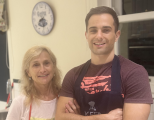-
Discovering And Appreciating Italian Vegetarian Cooking: Delving Further Into Nonna’s Repertoire
Teacher: Rosetta and Mario GiuricichCost: 2 days accommodation + R500 surchargeDates: At the heart of Italian culture is food. Food represents life: from the bounty that nature provides into the hands of the skilful cook to create a masterpiece, a skill that is passed down from generation to generation. The respect for and the appreciation of the natural source of ingredients in Italian cooking allows for the simplicity in the preparation and the unique taste of each dish prepared. Mother and son duo, Rosetta and Mario, have been passionate about Italian cooking their entire lives; a passion instilled in them from spending valuable time with Nonna Maria in her kitchen from young. In this retreat, we will share some more of Nonna Maria’s vegetarian Italian cooking: freshly made basil pesto (or roasted red pepper pesto) will be paired with light, pillowy potato gnocchi. Nonna’s vegetarian spaghetti carbonara will also be shared. Finally, we will end off with two traditional Italian desserts, a classic panna cotta and bigne alla crema (chocolate-topped profiteroles filled with Italian pastry cream), and the torta caprese (Italian hazelnut/almond gluten-free chocolate cake, a decadent tea-time classic).View teacher detailsRosetta and Mario Giuricich, mother and son duo, have both been deeply passionate about Italian cooking from a young age. Under the watchful eye of the maternal grandmother Nonna Maria, Mario was taught the skills underpinning Italian cooking. He further developed these skills by undertaking various part-time classes at the Silwood School of Cookery in Cape Town. Mario is an actuary with a PhD in Financial Mathematics. Rosetta is a medical doctor, practising in Cape Town.
At the heart of Italian culture is food. Food represents life: from the bounty that nature provides into the hands of the skilful cook to create a masterpiece, a skill that is passed down from generation to generation. The respect for and the appreciation of the natural source of ingredients in Italian cooking allows for the simplicity in the preparation and the unique taste of each dish prepared. Mother and son duo, Rosetta and Mario, have been passionate about Italian cooking their entire lives; a passion instilled in them from spending valuable time with Nonna Maria in her kitchen from young. In this retreat, we will share some more of Nonna Maria’s vegetarian Italian cooking: freshly made basil pesto (or roasted red pepper pesto) will be paired with light, pillowy potato gnocchi. Nonna’s vegetarian spaghetti carbonara will also be shared. Finally, we will end off with two traditional Italian desserts, a classic panna cotta and bigne alla crema (chocolate-topped profiteroles filled with Italian pastry cream), and the torta caprese (Italian hazelnut/almond gluten-free chocolate cake, a decadent tea-time classic).View teacher detailsRosetta and Mario Giuricich, mother and son duo, have both been deeply passionate about Italian cooking from a young age. Under the watchful eye of the maternal grandmother Nonna Maria, Mario was taught the skills underpinning Italian cooking. He further developed these skills by undertaking various part-time classes at the Silwood School of Cookery in Cape Town. Mario is an actuary with a PhD in Financial Mathematics. Rosetta is a medical doctor, practising in Cape Town. -
Self Retreating Mid Week
Teacher: Krishia Schilz and William (Shogan)Cost: Number of days' accommodation
15% discount offered on March mid-week bookingsDates:
 Find meaningful solitude on a Self-Retreat. One can do as much (or as little) reading, walking, meditation or resting as one chooses. Enjoy walks and bird watching in 300 acres of beautiful rolling hills and indigenous forests. Savour our delicious vegetarian food prepared with love by our wonderful cooks; or browse our well-stocked library. Visit the stupa and the raked Zen sand gardens and walk the labyrinth. Massage treatments, guided walks, qigong and meditation are offered by resident staff, Krishia and William mid week. Self-Retreats are an ideal opportunity to be in a gentle, sympathetic space where one can be still and get in touch with oneself.View teacher detailsKrishia Schilz is a qualified Bereavement Counsellor specialising in Grief and Loss, as well as Trauma Containment. Her spiritual path led her to Yoga in which she is certified in various styles. Krishia completed her training in the beautiful Bali, before locating to Thailand in order to teach. Her practice includes: yoga , pranayama (breath work), meditation, Yoga Philosophy and healing massage treatments.
Find meaningful solitude on a Self-Retreat. One can do as much (or as little) reading, walking, meditation or resting as one chooses. Enjoy walks and bird watching in 300 acres of beautiful rolling hills and indigenous forests. Savour our delicious vegetarian food prepared with love by our wonderful cooks; or browse our well-stocked library. Visit the stupa and the raked Zen sand gardens and walk the labyrinth. Massage treatments, guided walks, qigong and meditation are offered by resident staff, Krishia and William mid week. Self-Retreats are an ideal opportunity to be in a gentle, sympathetic space where one can be still and get in touch with oneself.View teacher detailsKrishia Schilz is a qualified Bereavement Counsellor specialising in Grief and Loss, as well as Trauma Containment. Her spiritual path led her to Yoga in which she is certified in various styles. Krishia completed her training in the beautiful Bali, before locating to Thailand in order to teach. Her practice includes: yoga , pranayama (breath work), meditation, Yoga Philosophy and healing massage treatments.William (Shogan) has been practising meditation for nearly 20 years, cultivating stillness and inquiry. He took precepts with Dae Chong, Osho at Poplar Grove and now leads morning and evening zazen at the BRC, weaving verses from the Dhammapada into meditation for reflection and insight. With a keen interest in how the Dharma might evolve in an AI-driven, multiplanetary future, William embraces both tradition and possibility. He also guides qigong in the mornings and offers tai chi in the afternoons, integrating movement into mindfulness. His practice is an invitation - to sit, to move, and to explore the ever-expanding nature of awareness.

